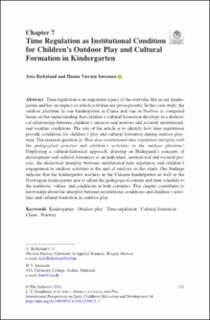| dc.contributor.author | Birkeland, Åsta | |
| dc.contributor.author | Sørensen, Hanne Værum | |
| dc.contributor.editor | Grindheim, Liv Torunn | |
| dc.contributor.editor | Sørensen, Hanne Værum | |
| dc.contributor.editor | Rekers, Angela | |
| dc.date.accessioned | 2021-09-01T08:25:21Z | |
| dc.date.available | 2021-09-01T08:25:21Z | |
| dc.date.created | 2021-08-01T11:42:58Z | |
| dc.date.issued | 2021 | |
| dc.identifier.citation | Birkeland, Å., & Sørensen, H. V. (2021). Time regulation as institutional condition for children’s outdoor play and cultural formation in kindergarten. In L. T. Grindheim, H. V. Sørensen, & A. Rekers (Eds.), Outdoor learning and play: Pedagogical practices and children’s cultural formation (pp. 111–128). Cham: Springer International Publishing. | en_US |
| dc.identifier.isbn | 978-3-030-72594-5 | |
| dc.identifier.uri | https://hdl.handle.net/11250/2772139 | |
| dc.description.abstract | Time regulation is an important aspect of the everyday life in any kindergarten and has an impact on which activities are given priority. In this case study, the outdoor playtime in one kindergarten in China and one in Norway is compared based on the understanding that children’s cultural formation develops in a dialectical relationship between children’s interests and motives and societal, institutional, and weather conditions. The aim of the article is to identify how time regulations provide conditions for children’s play and cultural formation during outdoor playtime. The research question is: How does institutional time regulation interplay with the pedagogical practice and children’s activities in the outdoor playtime? Employing a cultural-historical approach, drawing on Hedegaard’s concepts of development and cultural formation as an individual, institutional and societal process, the dialectical interplay between institutional time regulation and children’s engagement in outdoor activities is the unit of analysis in this study. Our findings indicate that the kindergarten teachers in the Chinese kindergarten as well as the Norwegian kindergarten aim to adjust the pedagogical content and time schedule to the traditions, values, and conditions in both countries. This chapter contributes to knowledge about the interplay between institutional conditions and children’s activities and cultural formation in outdoor play. | en_US |
| dc.language.iso | eng | en_US |
| dc.publisher | Springer | en_US |
| dc.relation.ispartof | Outdoor Learning and Play Pedagogical Practices and Children's Cultural Formation | |
| dc.rights | Navngivelse 4.0 Internasjonal | * |
| dc.rights.uri | http://creativecommons.org/licenses/by/4.0/deed.no | * |
| dc.subject | kindergarten | en_US |
| dc.subject | outdoor play | en_US |
| dc.subject | time regulation | en_US |
| dc.subject | cultural formation | en_US |
| dc.subject | China | en_US |
| dc.subject | Norway | en_US |
| dc.title | Time Regulation as Institutional Condition for Children's Outdoor Play and Cultural Formation | en_US |
| dc.type | Chapter | en_US |
| dc.type | Peer reviewed | en_US |
| dc.description.version | publishedVersion | en_US |
| dc.rights.holder | © The Author(s) 2021 | en_US |
| dc.subject.nsi | VDP::Samfunnsvitenskap: 200::Pedagogiske fag: 280::Allmennpedagogikk: 281 | en_US |
| dc.source.pagenumber | 111-128 | en_US |
| dc.identifier.doi | 10.1007/978-3-030-72595-2_7 | |
| dc.identifier.cristin | 1923257 | |
| cristin.ispublished | true | |
| cristin.fulltext | original | |

